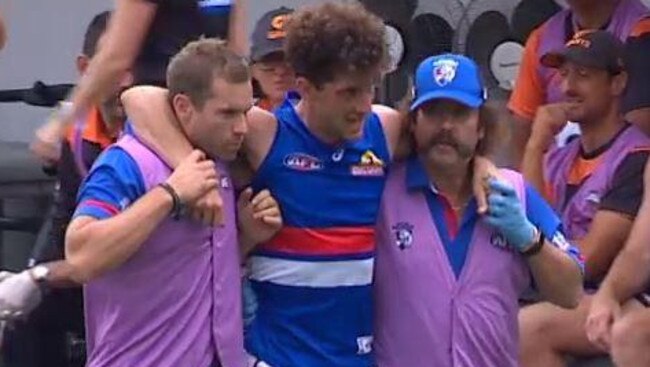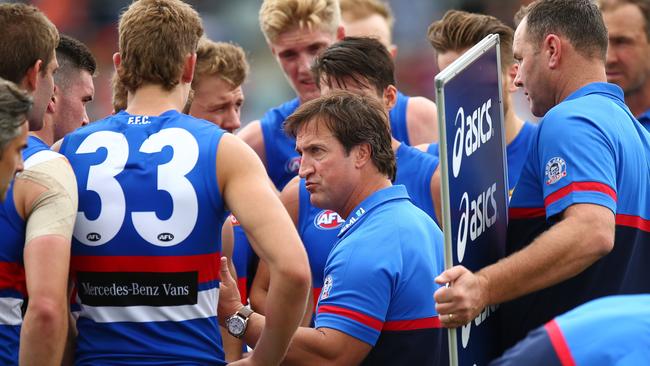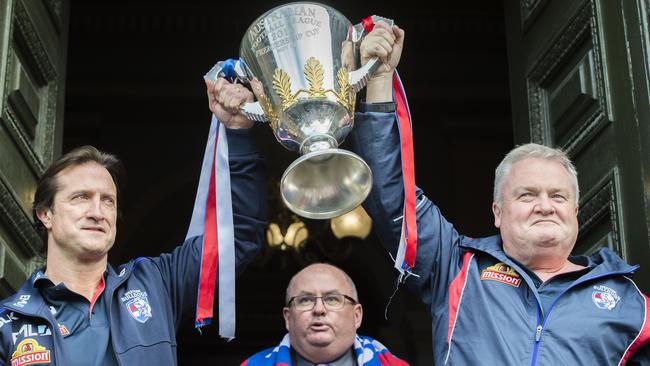Jon Anderson examines the key factors in the Western Bulldogs tumbling down the AFL ladder
THEY have gone from the best story in the AFL to a disaster. From on field woes to off field controversies, JON ANDERSON examines the key factors in the Western Bulldogs tumbling down the ladder.
Bulldogs
Don't miss out on the headlines from Bulldogs. Followed categories will be added to My News.
ASK a Western Bulldogs premiership player of 2016 what was the one thing that set Luke Beveridge aside from other coaches and the expression “left-field” is often to the fore.
Or a “surprising or unconventional position or style” as defined by a dictionary, a mindset that Beveridge implemented to ultimate effect in a winning season that few saw coming.
All but the mean-spirited found genuine joy in the Dogs winning their first flag (and only second in history) since 1954, in a year in which underdogs ruled the sporting world (Leicester in the EPL, Portugal in euro 16 and Cronulla Sharks in the NRL).
ROUND 2: DANIEL AMONG KEY BULLDOGS INCLUSION
SHOCKING LOSS: ‘WE EMBARRASSED OURSELVES’ — GORDON
STUFF UP: WHY REDPATH WON’T BE PLAYING THIS WEEK
So 23 games later and just 11 wins plus an unflattering 10th on the 2017 AFL ladder, where has the bite gone from the Bulldogs?
Never was the missing bite more evident than last week in Canberra against the GWS Giants.
A sad day highlighted by the sight of Tom Liberatore’s right knee giving way in an innocuous jog towards a loose ball.
The same Liberatore whose dedication over summer had promised so much, and whose teammates want nothing but success for a young man who mightn’t always make the right choices but one who has desperately been trying to do so.

The Canberra capitulation naturally leads to further forensic investigation, and when you run deep at the Bulldogs you start and end with two alpha male personalities in coach Beveridge and president Peter Gordon.
Let’s start with the coach, the one-time St Bede’s Mentone messiah who then conquered the AFL.
THE COACH
When the fall of a team is as spectacular as its rise, the natural way is to question the nature of his relationship with the team.
Those looking for salacious details of a large fallout will be disappointed to learn that the playing group remains committed to the message according to Beveridge.
ARE THERE DISSENTERS?
Naturally players who aren’t regularly playing would prefer senior action, with Mitch Wallis said to be frustrated rather than angry that a stellar pre-season didn’t eventuate in Round 1 senior action.
Should his career remain at VFL level (he’s in this week) then it would be natural for Wallis to look elsewhere next year.
You then ask has Beveridge changed in his three and a bit years with the club?
They say the easiest part for an apprentice coach is early on because largely supporters are prepared to offer a honeymoon period.
The real test comes when success becomes a stranger.
During a couple of the more testing times in 2017, Beveridge remained stoically supportive of his chargers in public forums.
Behind doors there was said to be change as he unloaded his frustrations on some players in clear voice of all team members.

That style was an area he had differed in from previous coaches, but natural enough when team rules or intent towards the ball is lacking.
So in the eyes of some the left-field thinker has reverted to a more garden variety AFL coach.
WHAT ELSE IS DIFFERENT THAN 2016?
Arguably a tinkering with coaching roles, one that takes place at most clubs on a regular enough basis, was seen by some as both unnecessary and unsettling.
Steven King, Geelong’s 2007 Premiership ruckman, went from coaching the rucks to looking after defence.
Why take him from an area he was seen to be so proficient in?
Yes, it broadens King’s CV should he one day want to further his coaching aspirations, but did it benefit the team?
And Rohan Smith, seen at least statistically to have done a fine job with the defensive unit, was shifted to a development role.
In the midfield Daniel Giansiracusa (stoppages) and Joel Corey share duties.

If they are always on the same page then there is no issue, but if mixed messages reach young ears, then confusion can reign.
And Beveridge is stubborn, as recently evidenced by his insistence on turning an All-Australian defender in Easton Wood into a forward.
But hey, at Hawthorn James Sicily and Blake Hardwick have successfully gone from forwards to defenders, as has Jeremy Howe at Collingwood. Maybe it’s harder going the other way.
One problem with taking Wood forward is you rob the backline of its most experienced member, a back six on Grand Final day of 2016 made up of Dale Morris (injured) Joel Hamling (now with Fremantle) Matthew Boyd (retired) Jason Johannisen, Fletcher Roberts and Wood.
Last Sunday that same starting unit was made up of 18-year old debutant Aaron Naughton, Bailey Williams, 20, Zaine Cordy, 21, Mitch Honeychurch, 23, Fletcher Roberts, 24, and Matthew Suckling, 29, when they lined up against GWS.
Surely a general is required, with captain Wood an obvious candidate.
They also went in easily the youngest in combined age (23 years, nine months, with Gold Coast next on 24.26) and in terms of average games (67.6, GC next on 79.1).

STRINGER
Then there was the departure of Jake Stringer to Essendon, one that on the outside could have been seen as unsettling but a call that was largely agreed upon by the playing group.
Stringer’s cause wasn’t helped by his relationship with the cousin of a teammate, not a crime in itself but not a popular romantic coupling from the eyes of the teammate.
GORDON
To president Gordon, a “my way or the highway” leader who has made his share of critics despite being an integral part of one of the AFL’s better feel-good stories in the recent era.
That CEOs haven’t enjoyed longevity at the Bulldogs is proof for some that Gordon can be an extremely challenging boss, and in recent times he has been in the red corner in an undignified public spat with club benefactor Susan Alberti.
The latter has cleverly orchestrated public opinion in her favour, but where it matters Gordon, like Beveridge, still has the support of his club.
In fact there was anger towards Alberti that by going rogue she had stolen the party of seven-goal AFLW heroine Brooke Lochland on the same weekend.

Gordon faces a delicate balancing act in encouraging the desperately required corporate support while not alienating the diehard Dogs who don’t want too much of their heritage eroded along the way.
ON THE PARK
From a playing-style perspective, Champion Data’s Daniel Hoyne explains it this way: “The Bulldogs have simply lost their brand of grunt and territory, which won them the flag in 2016.




